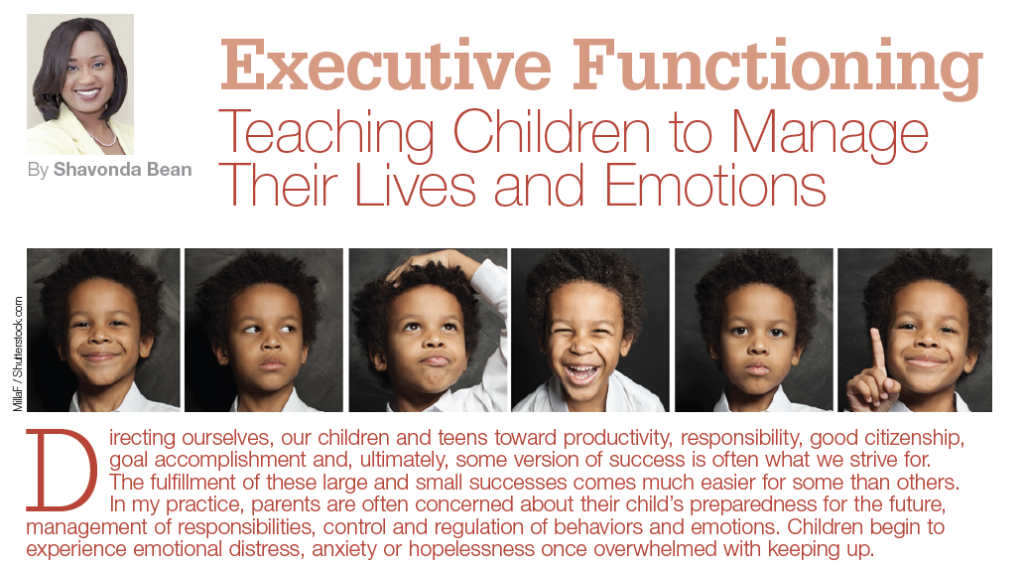Teaching Children to Manage Their Lives and Emotions

By Shavonda Bean
These challenges can occur for several reasons. One of the most common contributors can be weaknesses in executive functioning skills. This is an umbrella term used to describe a wide range of skill sets necessary to manage our lives, emotions and behaviors — much like an executive manages a business. Examples include mental flexibility, sustained attention, working memory, task initiation, inhibition, self-monitoring, planning, prioritizing, organizing, time management, emotional and behavioral regulation. Metacognition is achieved when one can manage and attain a level of self-reflection and regulation. Executive functioning is linked to the frontal lobe of the brain–the last area to develop prenatally and not fully mature until early 20’s.
We often underestimate the complexity of these skills. Unlike the natural process when toddlers learn to walk, executive skills need to be developed and taught gradually. It begins in infancy when caregivers create environments of interest, model behaviors and engage in play. Children as young as five further develop these abilities through minor responsibilities, learning to wait and follow instructions. Teens and adults learn to better adapt to challenges and manage significant responsibilities and relationships. When these skills are absent or underdeveloped, it can create a high level of stress for all involved and can create a barrier to managing life and attaining goals. Improving executive functioning skills will help children and adults become more capable and confident, empowered, independent and ultimately closer to that vision of accomplishment. Here’s how you start:
-Practice Building Working Memory- Have you noticed your child frequently having difficulty summarizing information, remembering more than one direction at a time or forgetting what they’ve read in an earlier paragraph? Working Memory is the ability to keep information in your active memory while performing a task or solving a problem. This complex storage process in the brain helps sustain attention, retain information and improves efficiency.
Young children can play matching games to build working memory. Use picture schedules for morning or bedtime routines. Attach new information to previously learned information, rehearse, use lists, visualize information, develop short, simple routines or practice mental math problem solving. Improved working memory means better reading comprehension, task completion, sustained attention and the ability to see a task through to completion.
– Manage Expectations: Better understand your child’s EF skill strengths and weaknesses. Several formal tests and interviews are used by professional psychologists or EF coaches to assess these skills. None of us is great at everything. Understanding and building on strengths is a great place to start.
– Empower: Look for opportunities to act as a coach to assist your child or teen rather than using discipline or punishment for shortcomings. Practice using positive language when describing your child’s needs or challenges. See these as growth opportunities.
– Ask for Help: Parents, coaches, teachers, siblings, employers and others can play an instrumental role in shaping these skills. When you’ve done all you can, do not hesitate to seek professional help. There are many therapists, psychologist and executive function coaches who can help you and/or your child develop and improve systems and strategies. Your child’s school counselor can also implement supports when EF weaknesses are related to Attention-Deficit/Hyperactivity Disorder or learning disabilities, as they often are. Reach out for help. It takes a village.
